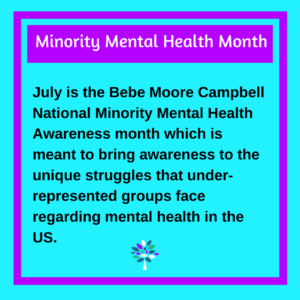Minority Mental Health Month

This month of Minority Mental Health Awareness was established in 2008 to highlight the unique struggles the minority communities face that affect their mental health and their access to mental health support.
Systemic oppression is directly tied to the mental health of BIPOC (Black Indigenous People of Color). Historical and contemporary injustices continue to perpetuate trauma through generations and into today. In 2017, 42% of youth ages 12-17 received care for a major depressive episode, but only 35% of black youth and 33% of Hispanic youth received treatment for their condition.
Native and indigenous people in the US are disproportionately affected by mental health and substance use issues with severely limited access to support and services. In 2017, 13% of youth ages 12-17 had at least one depressive episode, but that number was higher among American Indian and Alaska Native youth at 16%.
The identities of LGBTQ+ BIPOC are multidimensional which can compound the trauma experienced. This trauma can lead to severe mental health concerns.
BIPOC communities are resilient and have worked to uplift their communities despite systemic barriers and impact of trauma. Many of these communities are developing their own sources of healing, support and resilience. Check out the on-going docuseries: Strength Over Silence Video Series: Stories Of Courage, Culture And Community at NAMI.org
Sources: Mental Health America, NAMI, Substance Abuse and Mental Health Services Administration (SAMHSA)










